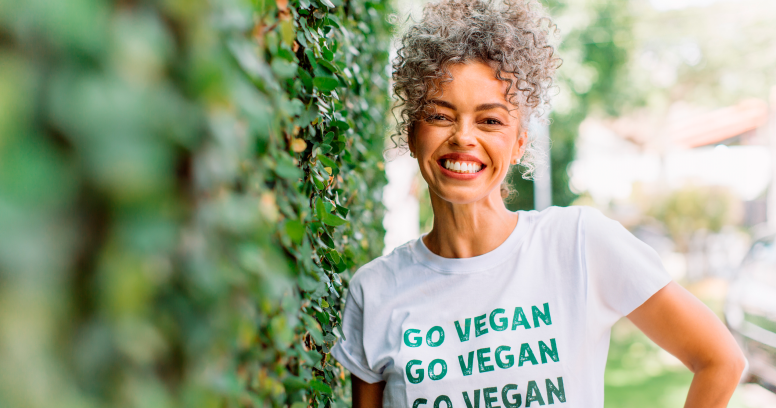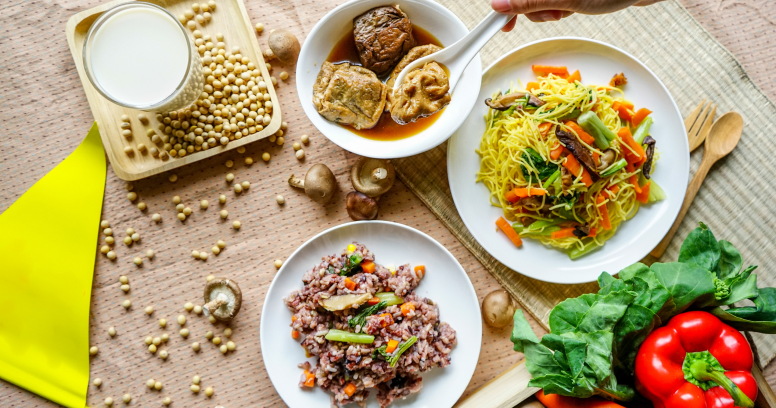Intermittent fasting for vegans: how to start intermittent fasting on a vegan meal plan

Whether you’re a carnivore, herbivore, or somewhere in between, you can easily incorporate intermittent fasting into your daily routine. Intermittent fasting doesn’t require any special type of diet, which means that you have lots of options, for instance, if you’re someone who prefers a plant-based or vegan diet.

But since both intermittent fasting and veganism, if not done correctly, could make it harder to get all the nutrients you need for good health, you’ll want to plan carefully to make sure your body gets all that it needs.[1]
If you follow a plant-based or vegan diet or are considering one, here’s what you need to know before you start intermittent fasting.
If you’re new to intermittent fasting, check out our guide to intermittent fasting for beginners. Then, dive into our Simple quiz. Not only will you discover the best fasting schedule tailored to your needs, but you’ll also gain full access to an array of features like our Nutrition Scores, food journal, and delicious recipes.
Why combine plant-based eating with intermittent fasting?
Researchers have found that following a well-designed plant-based diet can help people lose weight and lower their chances of developing certain chronic diseases — much like intermittent fasting does.[2]
So, could intermittent fasting plus a plant-based diet be a one-two-three punch for weight loss, health, and longevity?
Well, maybe.
Evidence from so-called Blue Zones — areas where people regularly live extra long, with a high quality of life even in later years — suggests that a combination of a mostly-plant-based diet and eating relatively lightly, often with fasting days, does seem to improve both lifespan and “healthspan” (i.e., how long you stay healthy).[3]
More research is required to further validate this, but the findings are exciting.
If you’re interested in exploring plant-based eating and intermittent fasting, it’s worth a shot — if you’re willing to put in the work to do it well.Balance is key when combining intermittent fasting and a vegan lifestyle. That’s why the Simple app is your ideal companion. Dive into curated recipes and insightful articles, plus make use of our fasting timer. And remember, any query you have, our Avo’s got the answer. Get started with our Simple quiz now!

How to do plant-based eating well
If you’re a plant-based eater or considering it, remember: just eliminating animal products alone won’t automatically make you healthier, fitter, or leaner. It’s quite possible to eat a poor-quality plant-based diet.
But if you combine plant-based eating with a focus on nutrient density — i.e., choosing foods like fruits and vegetables that are high in vitamins, minerals, and plant nutrients (phytonutrients) — that’s a different situation and one that’s very likely to support good health and a trim waistline.
So, what are the key principles for a healthy, nutritious plant-based diet?
Here’s your healthy plant-based cheat sheet.
Build your plant-based diet from:
- fruits and vegetables, ideally colorful ones
- beans and legumes (like black beans, chickpeas, and lentils)
- nuts and seeds (like almonds, walnuts, and pumpkin seeds)
- whole grains (like quinoa, amaranth, brown rice, rye, and steel-cut oats)
- healthy fats (like extra-virgin olive oil and avocados)
Choose minimally processed versions of foods, such as:
- whole grains instead of highly processed grains (e.g., brown instead of white rice; kernel corn instead of corn chips)
- baked potatoes instead of French fries
- fresh fruit instead of fruit juice
carrots instead of carrot cake (we know you knew that, but … just sayin’)
The risks of combining a vegan diet with intermittent fasting

While you certainly can cover most of your nutritional bases with a well-designed plant-based diet, there are a few areas where it can be tricky.[4]
Here are a few things to pay close attention to.
Getting enough energy
If you’re trying to lose weight, you want to eat less energy (calories) than you burn. But, you don’t want to eat too much less — which could leave you hungry and without enough calories for essential body functions.
Since a plant-based diet can sometimes be lower in energy (calories) than a typical Western diet, skipping meals may lower calories even further.
Try logging your food and drinks in the Simple food tracker to ensure you’re eating the right amount — a little less, but not too much less.
Getting enough protein
Eliminating animal products — such as fish, chicken, and lean cuts of beef, which are high-quality protein — means making sure you include more than one plant-based protein source in a sitting to get good overall quality protein.[5]
Try incorporating these sources of protein into your meals:
- high-protein grains (e.g., quinoa, buckwheat, oats, amaranth)
- beans and legumes
- tofu, tempeh, and edamame
- plant-based protein powder if you want to have a shelf-stable, high-protein option on hand — this is one of the few exceptions to minimizing highly processed foods
In doubt? Log your meals in the Simple food tracker, and our nutrition experts will let you know whether you’re eating enough protein for your needs.
Getting enough vitamins and minerals
Vitamin B12
Vitamin B12 is a crucial vitamin for health, but it mostly appears only in animal products. This means that without supplementation, many people eating a plant-based diet risk being deficient in B12.[6,7,8]
B12 deficiency can result in significant health concerns, such as megaloblastic anemia or neurological disorders. So it’s important to get enough.[9,10]
That said, there are a few plant products that can supply B12:[11]
- B-vitamin-fortified cereals (which supply other B vitamins as well)
- fermented beans and vegetables (such as tempeh or natto) — here, the B12 is provided by bacteria
- a few types of mushrooms
- seaweed
Remember: consult your healthcare provider first to get ongoing support with checking your B12 levels and supplementation.
Minerals
Plant-based diets may also be lower in important minerals such as:[12]
- iron
- zinc
- calcium
- potassium
- selenium
- iodine (unless you’re eating iodized salt and/or seaweed)
Electrolyte supplements can help replenish your levels of certain minerals, such as calcium and magnesium. (Again, speak with your healthcare provider and/or a registered dietitian, as they are best positioned to help.)
Omega-3 fatty acids
These essential fatty acids are found in both plant and animal sources, but compared to animal foods like fish and seafood, plant sources (such as flax, chia, hemp, or walnuts) are not as well converted to the types of omega-3s that our bodies need.[13,14]
If you don’t eat fatty fish, you might consider adding an algae oil supplement to get those heart-healthy omega-3s. Always read the manufacturer label to find out if the source of omega-3 is suitable.
However, before you go out and start supplementing randomly, talk to your healthcare provider first. Many nutrient deficiencies can be assessed with a simple blood test. Get a clear diagnosis before you hit the supplement store!
How to start intermittent fasting on a vegan diet plan

Plan what you’ll eat beforehand
Most people eat several times a day, which gives them plenty of opportunities to get enough nutrients. However, intermittent fasting often means that the eating window is shorter, and you may be eating fewer meals overall.
This means that you should carefully plan your meals and weekly menu to make sure you’re getting all the nutrition you need.
Look for higher-fiber and higher-protein options that will keep you feeling full longer, such as:
- tofu or tempeh
- beans and legumes
- whole grains
- starchy tubers (like potatoes, sweet potatoes, yuca, etc.)
Try using vegan-friendly intermittent fasting schedules
These types of intermittent fasting schedules are more likely to ensure you’ll hit your nutrient targets during your eating window.
- 14:10 — Eat nutritionally dense meals during a 10-hour window and fast for the next 14 hours.
- 5:2 — Eat normally five days a week and eat a restricted 500–600 calorie diet two days a week.
Drink plenty of water
Normally, you might get plenty of water from fruits and vegetables, but when you’re fasting, you’ll need to replace the water you’ve lost. Try to drink eight to ten cups of water per day while fasting.
Frequently asked questions about intermittent fasting and a vegan diet
Athletes generally need much more energy and nutrients than “regular people” to support both performance and recovery from intense training.
In theory, athletes can combine intermittent fasting and a vegan diet with proper planning if they make sure that they get enough energy and nutrients. It’s important to note that if you’re an athlete and reading this, you consult with a registered dietitian or nutritionist specializing in sports for personalized, evidence-based recommendations.
In general, we advise against intermittent fasting while pregnant or breastfeeding.
And, if you are pregnant and/or breastfeeding while on a plant-based diet, we recommend you consult with a healthcare professional to ensure you are meeting all your nutrient needs.

- Collier R. Intermittent fasting: The next big weight loss fad. CMAJ. 2013 May 14;185(8):E321–2.
- Jafari S, Hezaveh E, Jalilpiran Y, Jayedi A, Wong A, Safaiyan A, et al. Plant-based diets and risk of disease mortality: A systematic review and meta-analysis of cohort studies. Crit Rev Food Sci Nutr. 2022;62(28):7760–72.
- Buettner D, Skemp S. Blue zones: Lessons from the world’s longest lived. Am J Lifestyle Med. 2016 Jul 7;10(5):318–21.
- Craig WJ, Mangels AR, Fresán U, Marsh K, Miles FL, Saunders AV, et al. The safe and effective use of plant-based diets with guidelines for health professionals. Nutrients. 2021 Nov 19;13(11).
- Hertzler SR, Lieblein-Boff JC, Weiler M, Allgeier C. Plant proteins: Assessing their nutritional quality and effects on health and physical function. Nutrients. 2020 Nov 30;12(12).
- Woo KS, Kwok TCY, Celermajer DS. Vegan diet, subnormal vitamin B-12 status and cardiovascular health. Nutrients. 2014 Aug 19;6(8):3259–73.
- Pawlak R, Lester SE, Babatunde T. The prevalence of cobalamin deficiency among vegetarians assessed by serum vitamin B12: A review of literature. Eur J Clin Nutr. 2014 May;68(5):541–8.
- Pawlak R, Parrott SJ, Raj S, Cullum-Dugan D, Lucus D. How prevalent is vitamin B(12) deficiency among vegetarians? Nutr Rev. 2013 Feb;71(2):110–7.
- Hunt A, Harrington D, Robinson S. Vitamin B12 deficiency. BMJ. 2014 Sep 4;349:g5226.
- Alruwaili M, Basri R, AlRuwaili R, Albarrak AM, Ali NH. Neurological implications of vitamin B12 deficiency in diet: A systematic review and meta-analysis. Healthcare (Basel). 2023 Mar 27;11(7).
- White ND. Vitamin B12 and plant-predominant diets. Am J Lifestyle Med. 2022 May 4;16(3):295–7.
- Bakaloudi DR, Halloran A, Rippin HL, Oikonomidou AC, Dardavesis TI, Williams J, et al. Intake and adequacy of the vegan diet. A systematic review of the evidence. Clin Nutr. 2021 May;40(5):3503–21.
- Takic M, Pokimica B, Petrovic-Oggiano G, Popovic T. Effects of dietary α-linolenic acid treatment and the efficiency of its conversion to eicosapentaenoic and docosahexaenoic acids in obesity and related diseases. Molecules. 2022 Jul 13;27(14).
- Doughman SD, Krupanidhi S, Sanjeevi CB. Omega-3 fatty acids for nutrition and medicine: Considering microalgae oil as a vegetarian source of EPA and DHA. Curr Diabetes Rev. 2007 Aug;3(3):198–203.
